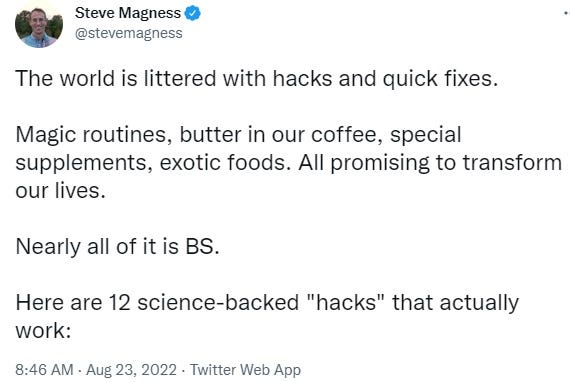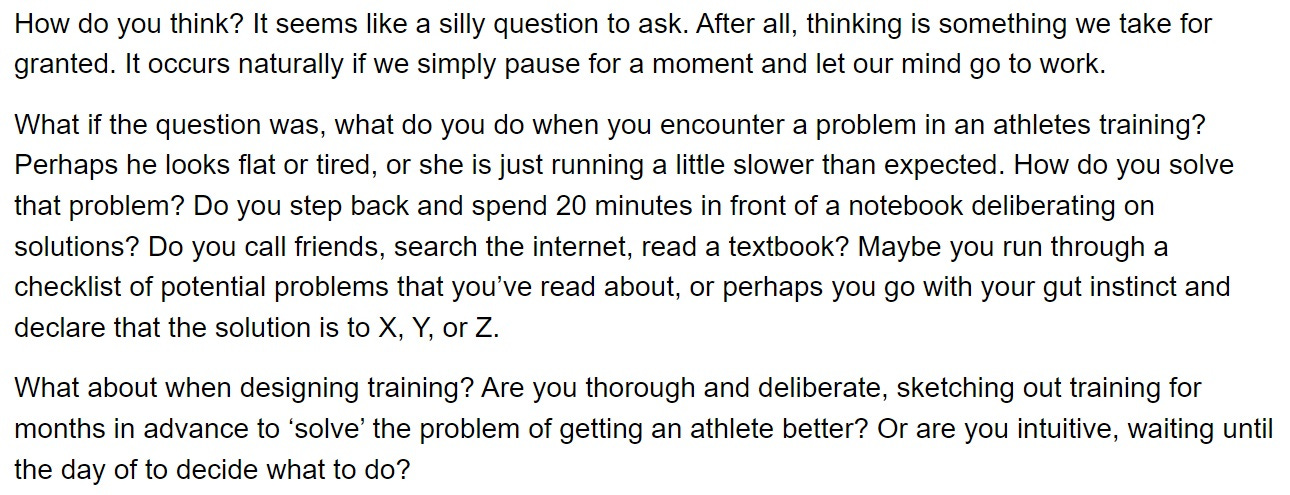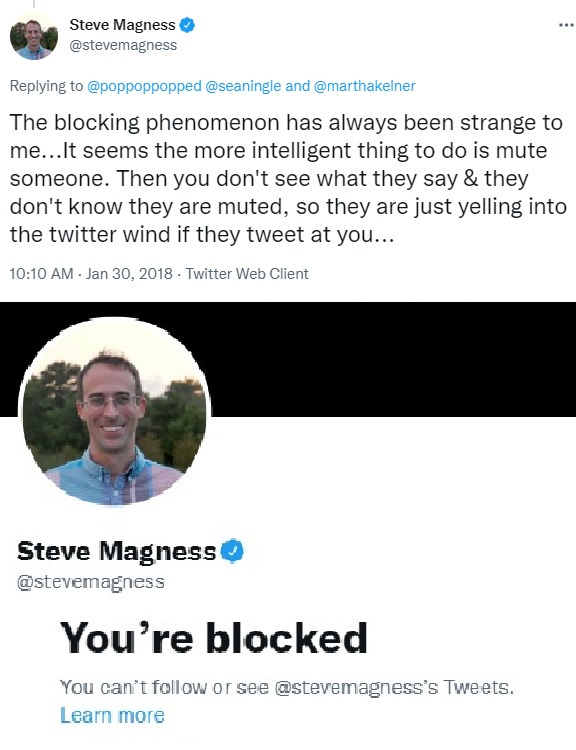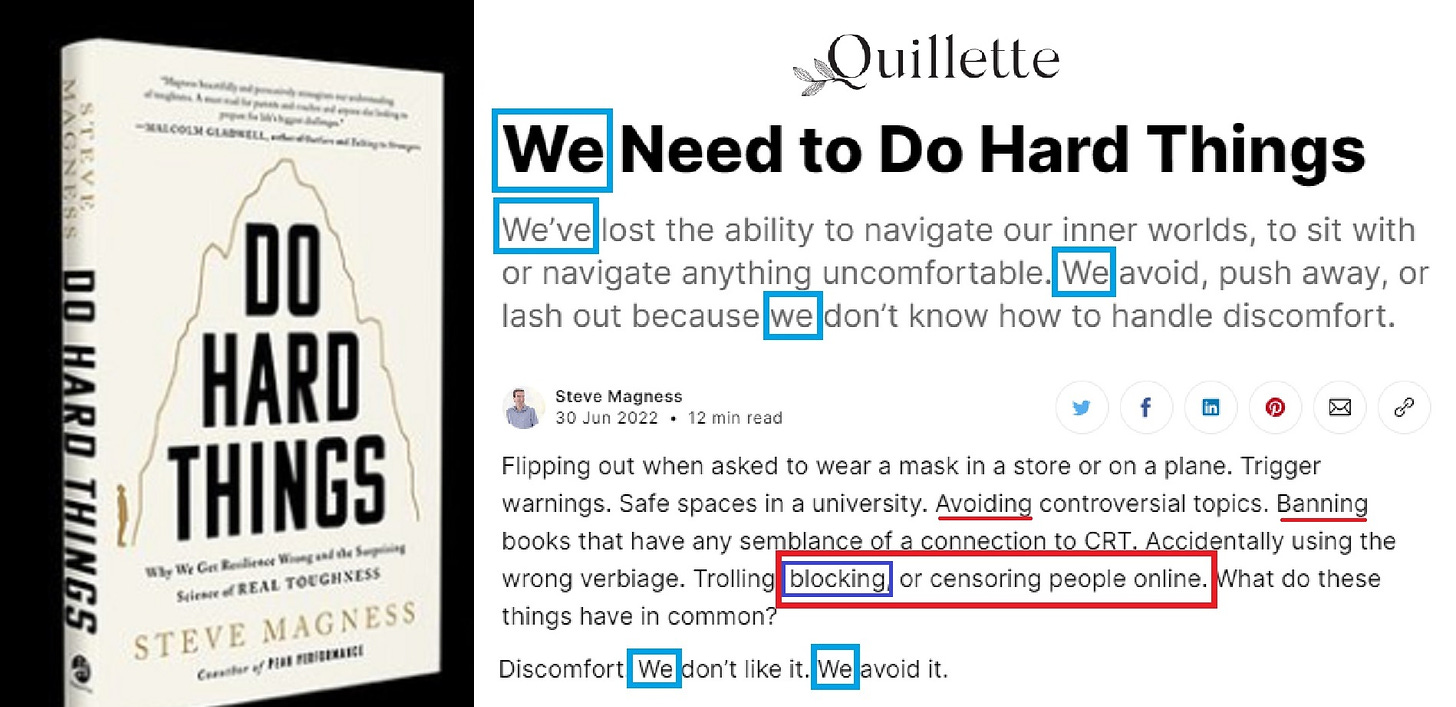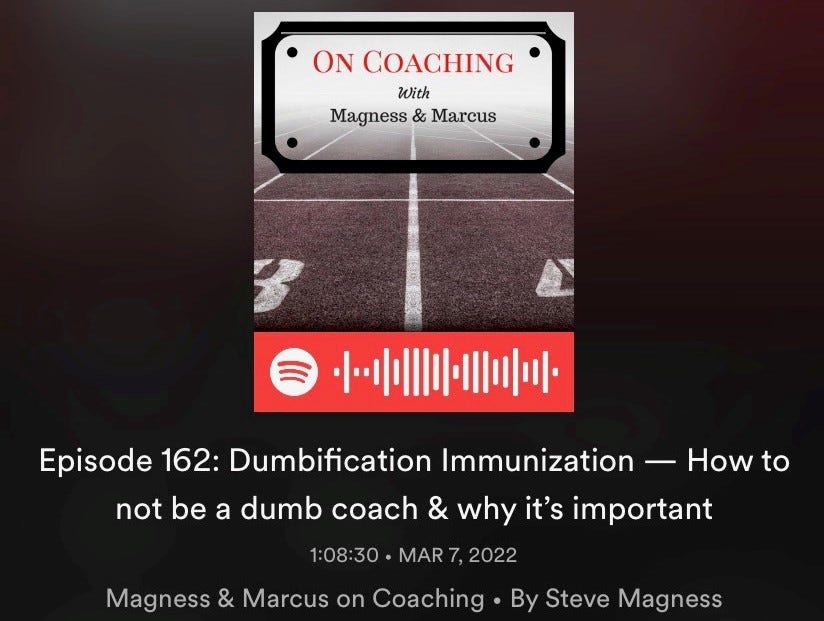Succinct wisdom for runners is not yet extinct, even if sophistry for hypocrites is more popular than ever
Apparently, Steve Magness has always been another ego-driven pseudo-intellectual gasbag
It’s cross-country season. For the first time in years, I’m not working directly with any high-school runners. But the members of the most recent batch are all competing for college teams, and I’m still in contact with all of them. I’m also editing a manuscript centering on the unlikely exploits of a high-school cross-country runner and his team from over fifty years ago, and much of it unfolds in familiar territory, so I’ve slipped into a sort of mode. It may be affecting my running in a positive way, but it’s unquestionably slowing down my output on this blog. That may not be a terrible thing; I cranked out eighteen “normal” posts and nine images-only displays in August, which has to be more than most people can or care to keep up with, especially the cartoons.
I occasionally encounter the words of an observer whose writing is economical to the point of curtness, yet lively enough to qualify as prosaic rather than perfunctory. These writers can make effective to-do lists in paragraph form without their readers even recognizing that they’ve been summoned to a particular action. Being inclined myself to expend 2,000 mostly vulgar words on making a point when 400 well-chosen ones would work just as well, I admire people who can convince me of something with seemingly little verbal effort.
Shorter version: Be wary of slogans, which only the skilled can use to impart powerful wisdom. DON’T fall prey to lazy, canned, italicized imperatives.
Below are examples of brief writing you can use. I’ve mentioned their source before—Jeff Johnson, who has spilled more booze than most of you ever even drank. Wait, wrong metaphor. Johnson has forgotten more about guiding competitive distance runners than most people, including many considered experts, will ever know.
"Coaches who have high expectations for their athletes, coaches who demand commitment, effort, discipline, and individual responsibility, invariably have the highest performing individuals and teams. People thrive when they are challenged."
"Compete fairly and honestly. Adhere to the unwritten laws of sportsmanship and fair play when you lead your athletes into competition. Otherwise, your attitude and behavior may result in a common, but rarely considered athletic injury, namely, an injury to their character, honor, or integrity."
"As a coach, you should convince your athletes that they are better athletes than they really are. Not a lot better, just a little better. If they believe in you, they will believe the more in themselves, perform beyond their expectations and you will be judged a prophet."
A new one of these is posted each week to this site, which now has about forty-six months’ worth of quotes.
Imagine Johnson being paid to churn out these tidbits while stripping them of all coherence and substance. Imagine him even going as far as advertising that his target audience consists of people easily swayed by nonsense. The results might look something like this:
“Homeopathy is like a person taking a pee in the Atlantic Ocean, then across the pond in the UK taking a cup of water, drinking it, and believing you had the persons pee in your water It's water. There is no substance.”
That’s a tweet from Steve Magness, also a former Nike coach and the author of a new book called Do Hard Things. Magness is perhaps best known for two things: Running a 4:01.02 mile in high school and never improving, and blowing the whistle on the rule-breaking of the Nike Oregon Project, which terminated him as an assistant coach in 2012. From Andy Brown’s October 2019 article at The Sports Integrity Initiative, in the wake of Alberto Salazar’s four-year suspension from coaching:
Magness told Panorama that he had seen reports whilst at the NOP suggesting that Galen Rupp was using testosterone and prednisone medication from 2002, when he was still at high school.
Magness’ claims first became public in 2015, a mere four years before Salazar was banned. In 2016, he was vocally anti-doping, to the point where he dismissed crazy performances such as Almaz Ayana’s 10,000-meter world record of 29:17.45 at the 2016 Summer Olympics in Rio de Janeiro:
Great. But when someone does this, he sets himself up for failures of consistency.
Magness has mentioned Shelby Houlihan once since Nike admitted she was months into a four-year ban of her own, in this noncommittal Twitter thread. After Jeff Manning wrote one of the worst pro-Shelby editorials I’ve seen—and there are plenty out there, every one of them idiotic—Magness was challenged on why he wasn’t ripping the piece to shreds. Magness replied that he’s already served his time in the anti-doping army and owes no one anything further.
So much for doing hard things— especially given that Magness routinely mentions doping in his tweets. It’s easier to just block people who question your hypocrisy.
Magness surely hasn’t changed his private stance on what’s fueling ridiculous times by an Ethiopian woman, even if that woman is now Letesenbet Gidey rather than Layana. But he symbolizes his own unwillingness to mix it up anymore by admitting “I’d rather it [dramatic recent improvements] be the shoes.” Okay, so a guru inviting people to do the hard work of thinking more often has simply decided to roll with the most emotionally pleasing option when it comes to cheating.
This shouldn’t come as a surprise. Magness’ primary weirdness has nothing to do with his giving up on confronting Nike, which would be more forgivable if he weren’t continually spewing platitudes and half-boiled assurances in all directions about everything else. He’s basically become the Morgan Freeman of running Twitter, invariably on hand to genially “correct” any opinions submitted before his arrival with another round of finger-waggling pablum.
Magness is fixated on getting people to give up on “hacks” and “quick fixes.” He’s done this by trying to convince people that his own staccato promises of success aren’t just as banal, cheeky, hollow, and repetitive as the “quick fixes.”
'He seems intent on a “switch-and-bait” strategy, using stupid stuff he knows grabs eyeballs to lure people into consuming his more robust strategies for self-improvement. Or maybe I’m giving him too much credit and superficial crapola is all he has left in the communications bag.
Magness didn’t like it when I suggested to him that he had evolved into the same snake-oil salesman as the people he criticizes. What’s left of that thread is here, but Magness deleted his responses after he blocked me, so you’ll have to trust me when I tell you that the first one said something like “Nice try at a gotcha, the quotes are around ‘hacks’ for a reason,” and the next one linked to a grammar site for reasons I can’t remember. He accused me of trolling, which is true. It’s also true he’s trolling all of Twitter. That’s the site’s primary purpose.
But Magness may want to bookmark a shitload of grammar sites, as this comes from his blog:
Magness seems convinced that no living person besides him sits around pondering these things. I bet Jeff Johnson does!
I also wonder if Magness’ book explores the fact that he continually revises his ideas about what’s hard to do or talk about and seems to follow none of his own advice.
Some of Magness’ stuff is trending toward the jabber of an old-school Saturday Night Live construct named Jack Handey.
It’s too bad that Magness was unable to provide evidence of actual doping within the NOP, even if the entire world understands that there is no benign explanation for some of the events he and others described, especially those surrounding Salazar’s prescription testosterone gel. He stuck his neck out, and in the end, I don’t know how much it helped him or the sport. The pro-doping forces will prevail in running for as long as Nike owns the sport and probably beyond, if there is a “beyond.”
But if Magness has completely given up on the very doping reality he described so vehemently in the aftermath of Ayana’s 29:17.45 and at other times, he should consider shutting up about it, because glibly pretending what’s happening within the Bowerman Track Club and elsewhere is entirely attributable to improved track spikes because it’s less psychically or cognitively intrusive is a poor way to position oneself as a deep thinker. It’s the epitome of “dumbification.”
Magness’ brother Phil is an anti-”new left” libertarian who is actually doing somewhat hard things by taking aim at absurdities like the 1619 Project and other instances of abysmal scholarship by Wokish truth-vandals. Hard, at least, in the sense of writing things that are unpopular but true. When Steve Magness was on the anti-doping train, he had some of that vibe, but he’s decided to play the “think yourself smart, it’s not easy” bozo instead.





